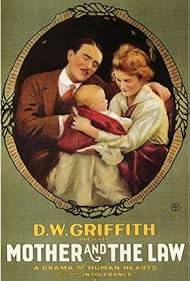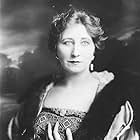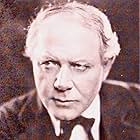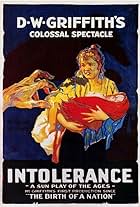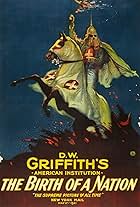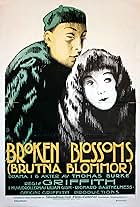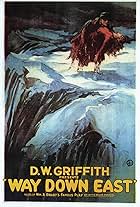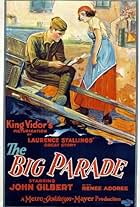A re-edited version of the 'modern' story from Intolerance (1916).A re-edited version of the 'modern' story from Intolerance (1916).A re-edited version of the 'modern' story from Intolerance (1916).
Photos
Mae Marsh
- The Little Dear One
- (archive footage)
Robert Harron
- The Boy
- (archive footage)
Miriam Cooper
- The Friendless One
- (archive footage)
Vera Lewis
- Miss Mary T. Jenkins
- (archive footage)
Sam De Grasse
- Arthur Jenkins
- (archive footage)
Clyde E. Hopkins
- Arthur Jenkins' Secretary
- (archive footage)
F.A. Turner
- The Dear One's Father
- (archive footage)
- (as Fred Turner)
Walter Long
- The Musketeer of the Town
- (archive footage)
Ralph Lewis
- The Governor
- (archive footage)
Tom Wilson
- The Kindly Heart
- (archive footage)
A.W. McClure
- The Priest
- (archive footage)
Lloyd Ingraham
- The Judge
- (archive footage)
William Brown
- The Warden
- (archive footage)
- (as William A. Brown)
Max Davidson
- The Kindly Neighbor
- (archive footage)
Alberta Lee
- The Wife of the Kindly Neighbor
- (archive footage)
Frank Brownlee
- The Brother of the Girl
- (archive footage)
Barney Bernard
- Attorney for the Boy
- (archive footage)
Luray Huntley
- An Uplifter
- (archive footage)
Storyline
Did you know
- TriviaA print of this film survives in the UCLA Film and Television Archives.
- ConnectionsEdited from Intolerance (1916)
Featured review
When his "Intolerance" (1916) failed to match the long-term box office returns of its predecessor, director D.W. Griffith extended the film's initial success by releasing two of his epic's four stories as separate features. These were "The Fall of Babylon" (comprising the film's opulent "Babylonian Story") and "The Mother and the Law" (comprising the film's outstanding "Modern Story" segments). These were released at a time when Griffith films continued to be in great demand.
Mixing old, cut, and brand new footage, "The Mother and the Law" is, on its own, an excellent film. The story was unreleased in 1914, then revised to follow-up the release of "The Birth of a Nation" (1915). Instead, it formed the basis for the anchor story of "Intolerance", which was at least partially influenced by the criticism of Griffith as a racist - which was not a accusation leveled in hindsight; it was immediate, and was a profound (and positive) influence on the rest of Griffith's career.
"Intolerance" was also criticized - this time, for Griffith's stinging attack on the Moralists (or Reformers) of society. In the film, they are the "Uplifters" group of women who proclaim, "We must have laws to make people good." These legislators of morality are still around, along with many of the themes Griffith covers in "The Mother and the Law". But, the director did not consider groups like "The Salvation Army" to be Uplifters - so, in new footage, they are seen doing positive work.
The most important change, or addition, to the story involves a scene which accompanies the devastating words, "Owing to your lack of care of the baby before we took it, it has died." Those familiar with "Intolerance" should be able to figure out how this line fits in; and, it accompanies an outstanding scene featuring Mae Marsh ("The Dear One"). We also learn that Robert Harron ("The Boy") had Miriam Cooper ("The Friendly One") as his "first sweetheart," which helps explain her motivation.
There are additional subtle, and some starkly different moments. Mr. Harron's passing of an open grave serves to put his own fate back in play. The additional footage of Harron and Ms. Marsh at a lumberyard is simplicity in complex. And, the striking original images remain - even the tortured spinster Vera Lewis (as Mary Jenkins) acting the line, "Seeing youth drawn to youth, Miss Jenkins realizes the bitter fact that she is no longer a part of the younger world," deserved singular praise, somewhere.
********* The Mother and the Law (8/18/19) D.W Griffith ~ Mae Marsh, Robert Harron, Miriam Cooper, Walter Long
Mixing old, cut, and brand new footage, "The Mother and the Law" is, on its own, an excellent film. The story was unreleased in 1914, then revised to follow-up the release of "The Birth of a Nation" (1915). Instead, it formed the basis for the anchor story of "Intolerance", which was at least partially influenced by the criticism of Griffith as a racist - which was not a accusation leveled in hindsight; it was immediate, and was a profound (and positive) influence on the rest of Griffith's career.
"Intolerance" was also criticized - this time, for Griffith's stinging attack on the Moralists (or Reformers) of society. In the film, they are the "Uplifters" group of women who proclaim, "We must have laws to make people good." These legislators of morality are still around, along with many of the themes Griffith covers in "The Mother and the Law". But, the director did not consider groups like "The Salvation Army" to be Uplifters - so, in new footage, they are seen doing positive work.
The most important change, or addition, to the story involves a scene which accompanies the devastating words, "Owing to your lack of care of the baby before we took it, it has died." Those familiar with "Intolerance" should be able to figure out how this line fits in; and, it accompanies an outstanding scene featuring Mae Marsh ("The Dear One"). We also learn that Robert Harron ("The Boy") had Miriam Cooper ("The Friendly One") as his "first sweetheart," which helps explain her motivation.
There are additional subtle, and some starkly different moments. Mr. Harron's passing of an open grave serves to put his own fate back in play. The additional footage of Harron and Ms. Marsh at a lumberyard is simplicity in complex. And, the striking original images remain - even the tortured spinster Vera Lewis (as Mary Jenkins) acting the line, "Seeing youth drawn to youth, Miss Jenkins realizes the bitter fact that she is no longer a part of the younger world," deserved singular praise, somewhere.
********* The Mother and the Law (8/18/19) D.W Griffith ~ Mae Marsh, Robert Harron, Miriam Cooper, Walter Long
- wes-connors
- Nov 23, 2010
- Permalink
Details
- Release date
- Country of origin
- Language
- Also known as
- Matka i prawo
- Production company
- See more company credits at IMDbPro
- Runtime1 hour 35 minutes
- Color
- Sound mix
- Aspect ratio
- 1.33 : 1
Contribute to this page
Suggest an edit or add missing content

Top Gap
By what name was The Mother and the Law (1919) officially released in Canada in English?
Answer